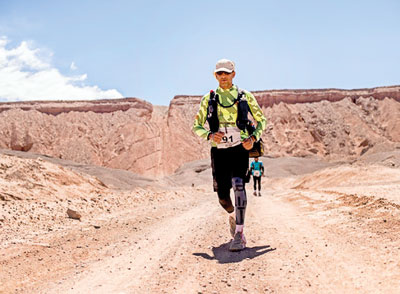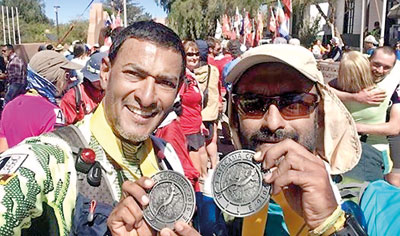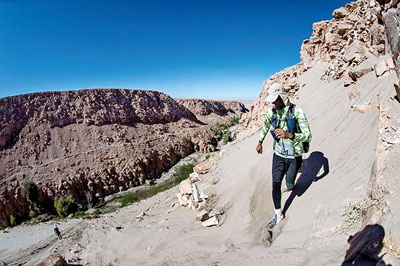A desert journey of discovery
View(s):Smriti Daniel meets Ruvan Ranatunga and Shihan Anthony John after their gruelling Atacama crossing

On a lonely desert road: Shihan John ( Pix courtesy: http://www.4deserts.com/atacamacrossing/photos)
Ruvan Ranatunga and Shihan Anthony John did not know quite what to make of the Japanese team.
It was early October and they were in the middle of one of the most demanding of the 4 Desert Races – a 6 day-long, 242 km crossing of the Atacama on foot.The plateau in Chile stretches 960 km south from the border of Peru, and its centre is recognized as the driest place on earth.The air was leached of moisture and temperatures swung wildly, from freezing in the morning, to baking under the afternoon Sun. The terrain was unpredictable: there were the steep hills and rocky valleys but one also had to slither and slide up sand dunes 150m high, and wade through shallow stretches of water.
Injuries were common as runners navigated fields of rocks sharp enough to slice through skin, and broccoli-like clusters of soil and stone that were an invitation to twist your ankle. Often you ran in complete isolation, participants so far ahead or behind that you could not see them. Little pink flags marked the long path, and you strayed at your own peril.
In the middle of this, Team AHO from Japan were like a dehydrated runner’s hallucination. They competed wearing multi-coloured wigs, with little fairy lights embedded in them. When everyone else was discarding all extraneous weight from their bulky back packs, this group carried colourful banners. At night, music blasted out of their portable stereo, shattering the silence of the desert night and keeping Ranatunga and John wide awake.

Mission accomplished: Ruvan Ranatunga and Shihan Anthony John
The two teams were only properly introduced when they met in the medical tent. Ranatunga and John noticed that the AHO group presented feet covered in enormous and painful blisters. When they saw the Sri Lankan duo had none, they made a long sound of awe, their mouths wide in a perfect O. “Basically, they had crawled that last stretch and they couldn’t believe our feet were fine,” says Ranatunga. John grins as he reports that the Japanese asked them, “Are you superhuman?”
Ranatunga and John say they only discovered what the AHO team was about at the awards banquet. Apparently, they were all there because of one man. He had begun to lose his eyesight and had previously tried to run this race alone and failed. His closest friends had decided they would help him complete it this year and they had, in the most joyous way possible.
“Looking back, it was the people we met that made it really amazing,” says John. He and Ranatunga have shed a few pounds but still manage to radiate good health – clearly a week running across a desert was exactly what the doctor ordered for these two. The first Sri Lankans to compete in a 4 Desert Race they say that starting out, their goal was simply to cross the finish line together. They finished 66 and 67 of 131 competitors.
Along the way, the team had their fair share of hiccups. John says Stage 1, where they began running at an altitude of 3,100m, was a huge challenge. “We had never really trained at that high an altitude. It was a very difficult first day, and I really struggled,” says John. “It was something new for us,” agrees Ranatunga. The two were plagued with throbbing heads and exhaustion, and John in particular became quite badly dehydrated. But they were feeling so good about being there that they simply learned what they needed to and moved on. Plus, there was the reminder that they were representing Sri Lanka. “Seeing our flag up at the starting line, in this unknown country, it gave us this sense of purpose,” says Ranatunga.
They also knew that back home in Jaffna, the group from Trail would be starting their walk to raise funds for cancer treatment, and that they were doing their part to help.

Jubilant: Ruvan Ranatunga at the finish line
Unfortunately, they were at a disadvantage before they had even begun. Despite a 13-hour layover in Paris, someone had failed to transfer their luggage for the final leg of the flight. Though they were carrying most of what they needed, and their competitors were kind enough to share things like salt tablets, the Sri Lankan duo would have to do without their sleeping pads and trekking poles. John says he was thinking of the airline when they were forced to scrabble up the sheer face of a sand dune. “The sand was burning, it was like putting your hands on a hot plate, but we didn’t have any other choice but to dig in and claw ourselves up. We were really pleased with the French for that.”
Though they were happy enough to leave some sections behind, its clear Ranatunga and John fell a little in love with the Atacama. “You might think that all there is in a desert is just sand, but there is so much more,” says Ranatunga, conjuring images of crossing salt flats that looked like snow but radiated the heat of the desert and stumbling upon little green oasis with streams winding through. “It’s hard to imagine that there is a sky so blue anywhere. In the night you can look and see all the stars and the Milky Way. Even though it was so cold, I would go out and just look up sometimes. It was so clear, and so beautiful, it is hard to describe.”
Though it was strenuous, John says they never over-extended themselves or felt like they were at the end of their tether. Any exhaustion would usually hit at night, when they finally arrived at camp. They couldn’t shower and so it was a session with the wet wipes before they went to bed. Toward the end of the trip, they weren’t eating very much either having found their food – like strawberry custard and protein bars – so unappetizing that they preferred to do without.
Despite some of these challenges, the team was in remarkably good form. They never needed the help of the camp doctors, says John, and they completed the run quite comfortably and without any injuries. Not everyone was so lucky – as many as 18 people started out but faltered along the way. On their third day, in keeping with the spirit of the race, John remembers how they supported another team who were struggling, only to be disappointed when the team failed to appear the next morning.
“They were forced to quit, and when we didn’t see them the next day it hurt,” says Ranatunga, “we didn’t know them, but it’s as if you do, because you know what it has taken to reach this point, and you know what it would mean to have to turn back. It was a feeling I had never had before.”

Down the sand dunes: Shihan John navigates a slippery slope
At 44 years old, Ranatunga has a good decade on John, who actually celebrated turning 34 with the much loathed strawberry custard while on the trail. For the former, continuing to test himself in these kinds of events proves that age needn’t hold you back. “We aren’t professional athletes, we are just ordinary guys who decided to do this together,” says Ranatunga. It is clear they make a great team, even though they “don’t mirror each other in any way.” What they do have in common is a love of the sport and a background in the armed forces. Military service has tested them in different ways, but they both still have the discipline they learned there.
Part of it is knowing exactly how far you can push yourself. Ranatunga says that every time he leaves his family – and in particular his son who is 12 years old now – behind, he does so in the certainty that he will not take unnecessary risks. “You manage it to the greatest level possible so you can come back to your family and friends. You don’t do mad things, you don’t do stupid things, you understand your body, you understand your limitations.”
Of course, many would argue that walking across the Atacama itself is unnecessary, but for Ranatunga it is a beautiful and unique experience. “If you want to see the world, to walk is the best way. You can ride through, you can drive through, you can fly through, but nothing puts you in touch with your surroundings as much as walking,” he says. “The sights, the sounds, the faces of people…you don’t leave them in a hurry. When you are walking through there is no adrenaline rush but you have all that time to absorb what is happening around you. You absorb the desert: the dryness of it, the texture of the earth, the slight breeze that suddenly goes by; you get to experience that.For someone who is willing to take that journey, that is the discovery.”
Shihan and Ruvan are still raising funds for Trail and cancer patients. You can donate here: https://trailsl.com/walkers/?walker=318


